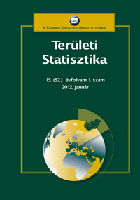Az éghajlatváltozás egészségkockázatai és népegészségügyi következményei – A
hőhullámokkal szembeni sérülékenység területi különbségei Magyarországon
Health risks and public health consequences of climate change – Climate vulnerability regarding heat waves and its regional differences in Hungary
Author(s): Annamária Uzzoli, Dániel Szilágyi, Attila BánSubject(s): Social Sciences, Economy, Geography, Regional studies
Published by: Központi Statisztikai Hivatal
Keywords: climate change; heat wave; climate vulnerability; health risk; regional differences
Summary/Abstract: Global climate change has an impact on health regarding its morbidity and mortality data as well as on the health care system. The connection between climate change and health has many serious consequences. There are determinative socioeconomic inequalities regarding climate vulnerability. The relevant solution of these challenges is an important task for national and local policies.The number, frequency and period of heat waves will increase in Europe as well as in Hungary in the future. Our project is based on this fact, and the main aim of this research was to apply a climate vulnerability model to analyse health risks and public health consequences of heat waves. This study presents the indicators of exposure, sensitivity and adaptive capacity, and explains the method of climate vulnerability model, too. Using climate vulnerability examination could help us to define regional differences at microregional level, to assign the most vulnerable areas in the country, and to discover typical spatial patterns of climate vulnerability. Summing up, climate vulnerability regarding heat waves has special spatial distribution in Hungary according to the increasing vulnerability among different parts ofthe country. There are some regions where higher level of exposure goes together with more sensitivity and lower level of adaptive capacity which can result in more or most vulnerability. These regions have special geographical position within Hungary. Stronger climate awareness and improving adaptive conditions will be a priority for making new health care strategies in the near future.
Journal: Területi Statisztika
- Issue Year: 59/2019
- Issue No: 04
- Page Range: 400-425
- Page Count: 26
- Language: Hungarian

